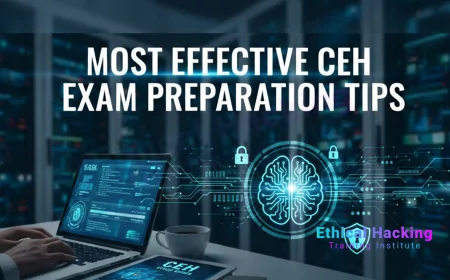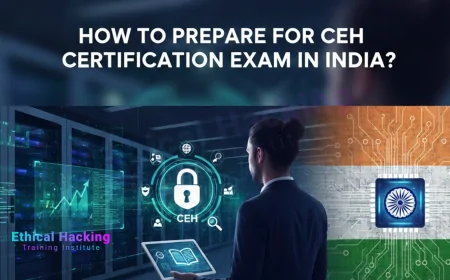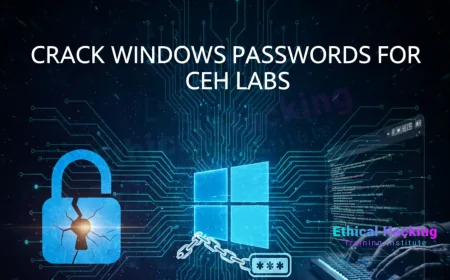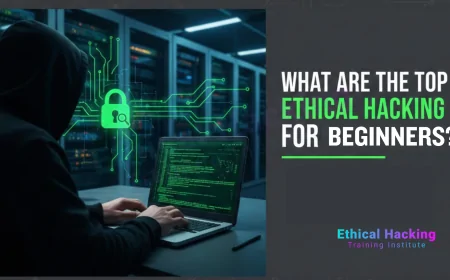Certified Ethical Hacker Training: How to Prepare for Your CEH Exam | CEH Training Strategies: How to Succeed in the Certified Ethical Hacker Exam
Master CEH exam preparation with certified ethical hacker training tips, labs, study plans, tools, and practice tests to help you pass on your first try.
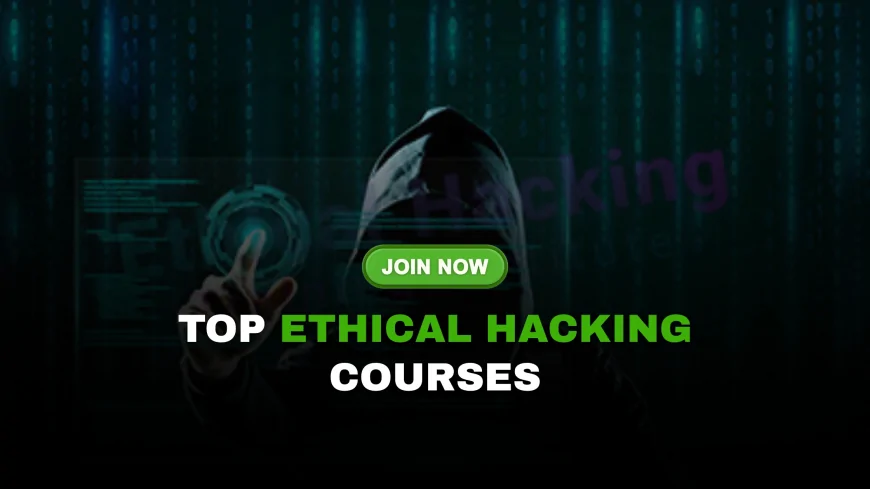
Table of Contents
- Introduction
- Why the CEH Certification Matters
- CEH Exam Overview
- Training Options & Delivery Formats
- Virtual Labs & Tools
- Detailed Study Plan
- Mock Exams & Practice Tests
- Exam-Taking Strategies
- Time Management Tips
- Building the Right Mindset
- Common Pitfalls & How to Avoid Them
- What to Expect on Exam Day
- After the Exam: What Comes Next
- FAQs
- Conclusion
Introduction
The Certified Ethical Hacker (CEH) credential from EC-Council is a benchmark in cybersecurity. This guide walks you through structured CEH exam preparation—starting from training options and virtual labs to mock tests, study plans, and mindset alignment.
Why the CEH Certification Matters
- Global Recognition: ANSI-approved, recognized by Fortune 500 firms.
- Ethical Offensive Skills: Learn attacker mindsets and tactics to strengthen defense.
- Career Accelerator: Opens roles in pentesting, security analysis, red teaming.
- Foundation for Advanced Certs: Steps towards CEH (Practical), OSCP, ECSA, CISSP.
CEH Exam Overview
The CEH exam (312-50) features:
- 125 multiple-choice questions in 4 hours
- Passing range typically between 60–85%
- Covers 20 modules including footprinting, malware analysis, web application testing, IoT and cloud security, cryptography
Training Options & Delivery Formats
- Self‑Paced Online: Recorded lectures + virtual labs (ideal for flexible study)
- Instructor-Led Live Online: Scheduled sessions with Q&A and guided lab time
- In-Person Classroom: Intensive training with peer learning
- Bootcamp Intensives: Fast-paced (5–10 days), hands-on and outcome-focused
- Hybrid Formats: Blend of self-paced and instructor-led to suit busy professionals
Virtual Labs & Tools
Labs are essential for translating theory into action. Expect access to:
- EC-Council iLabs or comparable platforms
- Explore a full range of ethical hacking tools including Nmap, Metasploit, Wireshark, SQLmap, and others used by professionals.
- Simulated network environments for red‑team exercises and vulnerability exploitation
- Resettable practice environments with guided modules and objectives
Hands-on labs reinforce conceptual learning and build confidence for the exam and real-world tasks.
Detailed Study Plan (10–12 Weeks)
- Weeks 1–3: Foundations – Networking, Linux, Windows basics, scripting refresher
- Weeks 4–5: Footprinting, Scanning, Enumeration – Practice Nmap, Wireshark
- Weeks 6–7: System Hacking, Malware, Sniffing – Focus on Metasploit, Trojans, Rootkits
- Weeks 8–9: focus on web application security, including SQL Injection, XSS, and hands-on practice with Burp Suite and OWASP labs.
- Weeks 10–11: Wireless, Mobile, IoT, Cloud – Map protocols and test real vulnerabilities
- Week 12: Cryptography, Pentest Methodology, Review – Practice exams and exam strategy
Mock Exams & Practice Tests
- Complete mini-assessments after each topic and strengthen your exam strategy with 2–3 timed practice tests.
- Analyze weak areas and focus follow‑up study
- Repeat mock tests until achieving consistent 80–90% scores
Exam‑Taking Strategies
- Read questions carefully: CEH uses tricky language, watch for absolutes ("always", "never")
- Evaluate the answer choices: Often one is clearly best after elimination
- Mark and move: Skip tough questions early and return later
- Time check: Spend ~1.8 minutes/question; don’t linger too long
- Stay calm: Read all options—first instinct isn't always corect
Time Management Tips
- Use a timer in practice tests to mimic exam conditions
- Allocate blocks for batch reviews and revise each week
- Include short breaks in study to stay fresh (25–30 min focus intervals)
- One week before exam, shift into review mode with summary notes and flashcards
Building the Right Mindset
Adopting a disciplined, curiosity-driven approach is key. Treat mistakes as learning moments and maintain motivation by celebrating weekly wins. Peer groups and mentors can provide encouragement and clarity.
Common Pitfalls & How to Avoid Them
- Skipping Labs: Practice is essential—always replicate labs
- Exam Overdrive: Avoid cramming. Use spaced reviews
- Review Oversight: Reinforce weak areas with targeted revision.
- No Flex Time: Build a review phase into your schedule before the exam date.
What to Expect on Exam Day
- Receive a system integrity check/proctoring in online or in-person mode
- Sit for 125 MCQs in 4 hours—stay calm and focused
- Submit answers when confident and ensure time remains for review
- Receive provisional/scored result based on EC-Council evaluation
After the Exam: What Comes Next
- Maintain certification—collect 120 EC-Council ECE credits over 3 years
- Consider going for CEH (Practical) to validate hands-on skills
- Explore next-level certs: ECSA, OSCP, CISSP, or specialized domains
- Use knowledge to break into roles: pen testing, SOC, threat hunting
- Share achievements—add badge to LinkedIn, resume, and professional networks
FAQs
1. How long should I study for CEH?
Approximately 10–12 weeks if studying part-time; bootcamps fast-track in 5–10 days.
2. Can I self-study or is training required?
You can self-study with 2+ years of IT experience, or attend accredited training if new.
3. Are virtual labs necessary?
Yes—they are crucial for applying tools and techniques effectively.
4. How many practice exams should I take?
At least 2–3 full mock exams, plus quizzes per module.
5. What’s a passing score?
It varies but generally ranges between 60–85% depending on exam form.
6. Can I retake the exam?
Yes, retakes are allowed after paying additional fees.
7. Is scripting required for CEH?
Basic Python or Bash scripting improves lab efficiency but isn’t mandatory.
8. How can I manage exam stress?
Take full-length mock exams, rest properly before exam day, and use relaxation techniques.
9. What happens if I fail?
You can purchase a retake voucher and focus on thorough review before retesting.
10. Do I need to renew CEH?
Yes—earn 120 ECE credits and pay annual maintenance for renewal every 3 years.
11. What is CEH (Practical)?
It’s a hands-on follow-up exam validating real-world penetration testing skills.
12. Is CEH globally recognized?
Yes—widely accepted by international organizations and governments.
13. Can I combine CEH with other certs?
Yes—many pursue CEH alongside CompTIA Security+, PenTest+, or OSCP.
14. Are there free CEH study materials?
Some are available online, but accredited courseware and labs are recommended.
15. Is CEH suitable for beginners?
Yes—with training; experienced professionals may qualify directly.
16. What tools should I prioritize?
Nmap, Metasploit, Burp Suite, Wireshark, Aircrack-ng—start with those.
17. Can I take the exam online?
Yes—remote proctoring is supported by EC-Council.
18. How do I track study progress?
Use lab logs, mock test scores, self-assessment sheets, and dashboards.
19. Does CEH include cloud security?
Yes—it covers modules on cloud vulnerabilities and related defenses.
20. What’s the next career step after CEH?
Roles like penetration tester, security analyst, red teamer, followed by advanced certs like OSCP and CISSP.
Conclusion
The CEH certification is both challenging and rewarding. A well-structured plan, consistent lab practice, mock exam rigor, and precise exam strategies can set you up for success. Beyond earning the certification, it builds a foundation for a cybersecurity career rooted in practical offensive-defensive skills. Stay focused, invest in your labs, and continuously learn—even after CEH!
What's Your Reaction?
 Like
0
Like
0
 Dislike
0
Dislike
0
 Love
0
Love
0
 Funny
0
Funny
0
 Angry
0
Angry
0
 Sad
0
Sad
0
 Wow
0
Wow
0







